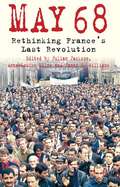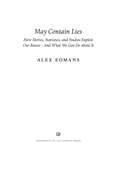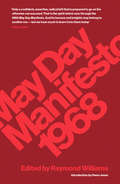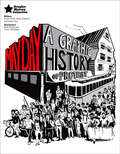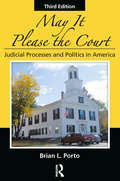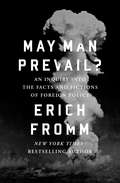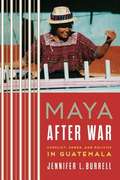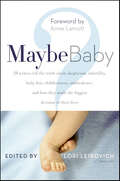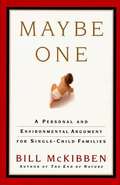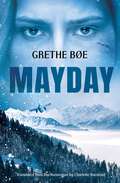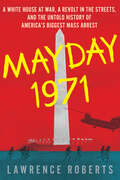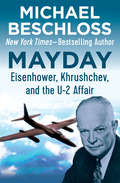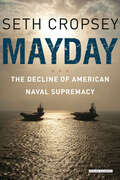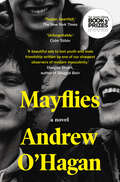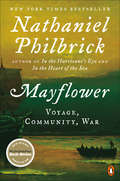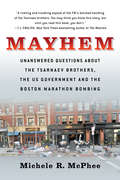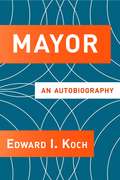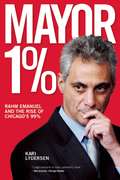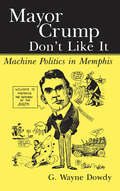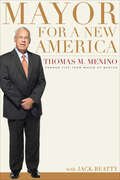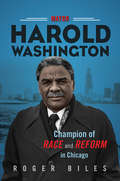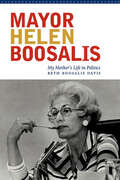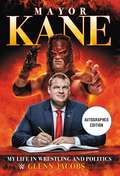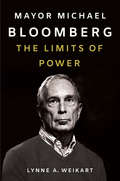- Table View
- List View
May 68: Rethinking France's Last Revolution
by Julian JacksonThe events of 1968 are often seen purely as a student revolution, but impacted on every aspect of French society - theatre, film, sexuality, race, the countryside, the factories. This volume explores the full diversity of this extraordinary upheaval, and shows how 1968 continues to reverberate in France today.
May Contain Lies: How Stories, Statistics, and Studies Exploit Our Biases—And What We Can Do about It
by Alex EdmansHow our biases cause us to fall for misinformation—and how to combat it. Our lives are minefields of misinformation. It ripples through our social media feeds, our daily headlines, and the pronouncements of politicians, executives, and authors. Stories, statistics, and studies are everywhere, allowing people to find evidence to support whatever position they want. Many of these sources are flawed, yet by playing on our emotions and preying on our biases, they can gain widespread acceptance, warp our views, and distort our decisions. In this eye-opening book, renowned economist Alex Edmans teaches us how to separate fact from fiction. Using colorful examples—from a wellness guru’s tragic but fabricated backstory to the blunders that led to the Deepwater Horizon disaster to the diet that ensnared millions yet hastened its founder’s death—Edmans highlights the biases that cause us to mistake statements for facts, facts for data, data for evidence, and evidence for proof. Armed with the knowledge of what to guard against, he then provides a practical guide to combat this tide of misinformation. Going beyond simply checking the facts and explaining individual statistics, Edmans explores the relationships between statistics—the science of cause and effect—ultimately training us to think smarter, sharper, and more critically. May Contain Lies is an essential read for anyone who wants to make better sense of the world and better decisions.
May Day Manifesto 1968
by Owen Jones Raymond WilliamsAnniversary edition of the classic political manifestoUrgently relevant to current arguments about the crisis of austerity, the 1968 manifesto set out a new agenda for socialist Britain, after the failure of the postwar consensus. It sought to change the nature of the state, to drive a wedge between finance and empire, to stress the importance of a planned economy for all, and to detach Britain from the imperial goals to which it had long been committed. Today, the spirit of The May Day Manifesto offers a road map to a brighter future.The original publication brought together the most influential radical voices of the era. Among the seventy signatories were Raymond Williams, E. P. Thompson, Stuart Hall, Iris Murdoch, Terry Eagleton, Ralph Miliband, and R. D. Laing. This edition comes with an introduction from Owen Jones, who brings a sense of urgency and hope to the contemporary debate.
May Day: A Graphic History of Protest
by Mark Leier Robin Folvik Sean Carleton Graphic History CollectiveMay Day: A Graphic History of Protest traces the development of International Workers’ Day, May 1st, against the ever-changing economic and political backdrop in Canada. Recognizing the importance of work and the historical struggles of workers to improve their lives, with a particular focus on the struggles of May 1st, the comic includes the reader as part of this history, and the story concludes that “We are all part of this historical struggle; it’s our history and our future.”
May It Please the Court, Third Edition: Judicial Processes and Politics In America
by Brian L. PortoThis practical, comprehensive, and engaging introduction to the American judicial system is designed primarily for undergraduate students in criminal justice, liberal arts, political science, and beginning law. It differs from other texts not only by delivering an insider’s view of the courts, but also by demonstrating how the judicial process operates at the intersection of law and politics. Unlike the many dull and inaccessible texts in this field, May It Please The Court conveys the human drama of civil and criminal litigation. With an updated epilogue, case studies, and discussion questions, this third edition is a robust resource for criminal justice students.
May Man Prevail?: An Inquiry into the Facts and Fictions of Foreign Policy (Paidos Studio Ser.)
by Erich FrommAn engulfing study of the turmoil and uncertainty that pervaded the early 1960s, when the world was preoccupied with the threat of a nuclear holocaustThe early 1960s were a time of existential unease across the world. The constant threat of a nuclear bomb—and of mutually assured destruction—led to a palpable sense that nuclear holocaust could occur any day. It was in this Cold War environment that social psychologist Erich Fromm wrote May Man Prevail? By analyzing the enemy stereotypes and mutual projections that were prevalent in the foreign policies of the Soviet Union and the United States, Fromm pointed to the anxieties on both sides and illustrates how paranoid thinking in the political realm can be extremely dangerous. With his excellent psychological analysis of the mindsets of the major players of the time, Fromm helped us overcome the Cold War&’s ideologies and fictions. This ebook features an illustrated biography of Erich Fromm including rare images and never-before-seen documents from the author&’s estate.
Maya after War: Conflict, Power, and Politics in Guatemala
by Jennifer L. BurrellGuatemala’s thirty-six-year civil war culminated in peace accords in 1996, but the postwar transition has been marked by continued violence, including lynchings and the rise of gangs, as well as massive wage-labor exodus to the United States. For the Mam Maya municipality of Todos Santos Cuchumatán, inhabited by a predominantly indigenous peasant population, the aftermath of war and genocide resonates with a long-standing tension between state techniques of governance and ancient community-level power structures that incorporated concepts of kinship, gender, and generation. Showing the ways in which these complex histories are interlinked with wartime and enduring family/class conflicts, Maya after War provides a nuanced account of a unique transitional postwar situation, including the complex influence of neoliberal intervention. Drawing on ethnographic field research over a twenty-year period, Jennifer L. Burrell explores the after-war period in a locale where community struggles span culture, identity, and history. Investigating a range of tensions from the local to the international, Burrell employs unique methodologies, including mapmaking, history workshops, and an informal translation of a historic ethnography, to analyze the role of conflict in animating what matters to Todosanteros in their everyday lives and how the residents negotiate power. Examining the community-based divisions alongside national postwar contexts, Maya after War considers the aura of hope that surrounded the signing of the peace accords, and the subsequent doubt and waiting that have fueled unrest, encompassing generational conflicts. This study is a rich analysis of the multifaceted forces at work in the quest for peace, in Guatemala and beyond.
Maybe Baby: 28 Writers Tell the Truth About Skepticism, Infertility, Baby Lust, Childlessness, Ambivalence, and How They Made the Biggest Decision of Their Lives
by Lori LeibovichTo breed or not to breed? That is the question twenty-eight accomplished writers ponder in this collection of provocative, honest, soul-searching essays. Based on a popular series at Salon.com, Maybe Baby offers both frank and nuanced opinions from a wide range of viewpoints on parenting choices, both alternative and traditional. Yes: "I've been granted access to a new plane of existence, one I could not have imagined, and would not now live without."—Peter NicholsNo: "I can sort of see that it might be nice to have children, but there are a thousand things I'd rather spend my time doing than raise them."—Michelle GoldbergMaybe: "As we both slip into our mid-thirties, my own personal daddy dilemma has quietly taken on an urgency that I frankly didn't expect."—Larry SmithFrom infertility to adoption, from ambivalence to baby lust, Maybe Baby brings together the full force of opinions about this national, but also intensely personal, debate.
Maybe One: A Personal and Environmental Argument for Single-Child Families
by Bill MckibbenFrom the ground breaking author of "The End of Nature" comes a provocative, compelling, and environmentally sound argument for saving the planet through voluntary population control.
Mayday
by Grethe BøeGet ready to be thrilled by a brand new heroine, Ylva Norvahl.Fighter pilot Ylva Norvahl has returned to her hometown, Bodø, in Norway's frozen north where tension is escalating across the border with Russia. NATO has launched the "Arctic Blizzard" excercise, mobilising 60,000 soldiers, many of them American.All it takes is one false move to trigger a major political crisis, or even a war.When her plane is forced down over Russian territory, Ylva and the veteran U.S. Major John Evans must race against time across a frozen landscape to avoid capture by the Russian Spetsnaz special forces in pursuit. Complicating their journey is Evans' involvement with an American military contractor Titans Security which has its own agenda across international frontiers.As the hunt closes in, Ylva uses her local Sami knowledge to survive in the excruciating cold, and her family history reveals dark secrets of its own in this geopolitical game of chess.
Mayday 1971: A White House at War, a Revolt in the Streets, and the Untold History of America's Biggest Mass Arrest
by Lawrence RobertsAn “illuminating” account of the largest act of civil disobedience in US history “that resonates today, when our democracy is again being challenged” (Larry Tye, New York Times–bestselling author of Demagogue).They surged into Washington by the tens of thousands in the spring of 1971. Fiery radicals, flower children, and militant vets gathered for the most audacious act in a years-long movement to end America’s war in Vietnam: a blockade of the nation’s capital. And the White House, headed by an increasingly paranoid Richard Nixon, was determined to stop it.Washington journalist Lawrence Roberts, drawing on dozens of interviews, unexplored archives, and newfound White House transcripts, recreates these largely forgotten events through the eyes of dueling characters. Woven into the story too are now-familiar names including John Kerry, Jane Fonda, and Daniel Ellsberg, leaker of the Pentagon Papers. It began with a bombing inside the US Capitol—a still-unsolved case to which Roberts brings new information. To prevent the Mayday Tribe’s guerrilla-style traffic blockade, the government mustered the military. Riot squads swept through the city, arresting more than 12,000 people. As a young female public defender led a thrilling legal battle to free the detainees, Nixon and his men took their first steps down the road to the Watergate scandal and the implosion of the presidency. Mayday 1971 is the ultimately inspiring story of a season when our democracy faced grave danger, and survived.“Award–winning investigative reporter Lawrence Roberts tells the story superbly from start to finish . . . presents a lot of new and overlooked material.” —The Wall Street Journal“Fast-moving, and fascinating.” —Christian Science Monitor
Mayday: Eisenhower, Khrushchev and the U-2 Affair
by Michael BeschlossOn May 1, 1960, Francis Gary Powers flew a U-2 spy plane deep into Soviet airspace and was downed. Powers and his equipment survived and were captured, becoming a pivotal episode in the Cold War.
Mayday: Eisenhower, Khrushchev, and the U-2 Affair
by Michael BeschlossThe &“definitive&” book on the U-2 episode and its disastrous impact on the future of the Cold War (Kirkus Reviews). On May Day 1960, Soviet forces downed a CIA spy plane flown deep into Soviet territory by Francis Gary Powers two weeks before a crucial summit. This forced President Dwight Eisenhower to decide whether, in an effort to save the meeting, to admit to Soviet Premier Nikita Khrushchev—and the world—that he had secretly ordered Powers&’s flight, or to claim that the CIA could take such a significant step without his approval. In rich and fascinating detail, Mayday explores the years of U-2 flights, which Eisenhower deemed &“an act of war,&” the US government&’s misconceived attempt to cover up the true purpose of the flight, Khrushchev&’s dramatic revelation that Powers was alive and in Soviet custody, and the show trial that sentenced the pilot to prison and hard labor. From a U-2&’s cramped cockpit to tense meetings in the Oval Office, the Kremlin, Camp David, CIA headquarters, the Élysée Palace, and Number Ten Downing Street, historian Michael Beschloss draws on previously unavailable CIA documents, diaries, and letters, as well as the recollections of Eisenhower&’s aides, to reveal the full high-stakes drama and bring to life its key figures, which also include Richard Nixon, Allen Dulles, and Charles de Gaulle. An impressive work of scholarship with the dramatic pacing a spy thriller, Mayday &“may be one of the best stories yet written about just how those grand men of diplomacy and intrigue conducted our business&” (Time).
Mayday: The Decline of American Naval Supremacy
by Seth CropseyA naval expert charts the rise and fall of America’s maritime supremacy—and what it means for the future of U.S. security and prosperity.As with other powerful nations throughout history, maritime supremacy has been the key to America’s superpower status and the relative peace of the postwar era. But in the twenty-first century, the United States Navy’s combat fleet has dwindled to historic lows—the smallest since before World War I. At the same time, rival nations such as China have increased the size of their navies at an extraordinary rate. As Seth Cropsey convincingly argues, the precipitous decline of the U.S. as a great seapower will have profound consequences sooner than we might think. In clear and concise language, Mayday tracks the modern evolution of U.S. maritime strength, where it stands now, and the likely consequences if changes are not made to both the Navy’s size and shape and to the United States’ strategic understanding of how to combine maritime and continental force.
Mayflies: A Novel
by Andrew O'HaganAn unforgettable coming-of-age novel that becomes a profound mediation on life, death, and lifelong friendship.Everyone has a Tully Dawson: the friend who defines your life.In the summer of 1986, in a small Scottish town, James and Tully ignite a brilliant friendship based on music, films and the rebel spirit. With school over and the locked world of their fathers before them, they rush towards the climax of their youth: a magical weekend in Manchester, the epicentre of everything that inspires them in working-class Britain. There, against the greatest soundtrack ever recorded, a vow is made: to go at life differently.Thirty years on, half a life away, the phone rings. Tully has news--news that forces the life-long friends to confront their own mortality head-on. What follows is an incredibly moving examination of the responsibilities and obligations we have to those we love. Mayflies is at once a finely-tuned drama about the delicacy and impermanence of human connection and an urgent inquiry into some of the most important questions of all: Who are we? What do we owe to our friends? And what does it mean to love another person amidst tragedy?
Mayflower: A Story of Courage, Community, and War
by Nathaniel PhilbrickHow did America begin? That simple question launches the acclaimed author of Bunker Hill and Valiant Ambition on an extraordinary journey to understand the truth behind our most sacred national myth: the voyage of the Mayflower and the settlement of Plymouth Colony. As Philbrick reveals in this electrifying history of the Pilgrims, the story of Plymouth Colony was a fifty-five year epic that began in peril and ended in war. New England erupted into a bloody conflict that nearly wiped out the English colonists and natives alike. These events shaped the existing communities and the country that would grow from them.
Mayhem: Unanswered Questions about the Tsarnaev Brothers, the US Government and the Boston Marathon Bombing
by Michele R. McPheeMayhem goes a long way toward answering questions that still linger about the notorious Boston Marathon bombing, such as: Where were the bombs made? And what had been Tamerlan Tsarnaev's relationship to the FBI? This page-turning narrative casts a spotlight on the US Government's relationship with the older Tsarnaev brother as his younger brother, Dzhokhar, continues his efforts to have his death sentence commuted.The federal government may be forced to confirm a longstanding relationship with Tamerlan and its decision to shield him from investigation for the Sept. 11, 2011 ISIS-style triple murder of three friends. As they infamously did with Whitey Bulger, federal agents appear to have protected Tamerlan because of his value as a paid informant. Mayhem is a substantially revised and updated first paperback edition of Michele R. McPhee's earlier book about the bombing, Maximum Harm.
Mayor
by Edward I. KochThe controversial ex-mayor of New York speaks out on his years in office, the people, and the policies of "the Big Apple".
Mayor 1%
by Kari LydersenHow did a city long dominated by a notorious Democratic Machine become a national battleground in the right-wing war against the public sector? In Mayor 1%, veteran journalist Kari Lydersen takes a close look at Chicago mayor Rahm Emanuel and his true agenda.With deep Wall Street ties from his investment banking years and a combative political style honed in Congress and the Clinton and Obama administrations, Emanuel is among a rising class of rock-star mayors promising to remake American cities.But his private-sector approach has sidelined and alienated many who feel they are not part of Emanuel's vision for a new Chicago-and it has inspired a powerful group of activists and community members to unite in defense of their beloved city.Kari Lydersen is a Chicago-based journalist, author and journalism instructor who has written for the Washington Post, the New York Times, the Progressive, In These Times, and other publications. She is the author of four books, including The Revolt on Goose Island: The Chicago Factory Takeover and What it Says About the Economic Crisis. She specializes in coverage of labor, energy and the environment. She has taught at Columbia College Chicago and Northwestern University and also works with youth from low-income communities through the program We the People Media. karilydersen dot com.
Mayor Crump Don't Like It: Machine Politics in Memphis
by G. Wayne DowdyIn the 1930s thousands of African Americans abandoned their long-standing allegiance to the party of Abraham Lincoln and began voting for Democratic Party candidates. This new voting pattern remapped the nation's political landscape and altered the relationship between citizen and government. One of the forgotten builders of this modern Democratic Party was Memphis mayor and congressman Edward Hull Crump (1874-1954). Crump created a biracial, multiethnic coalition within the segregated South that transformed the Mississippi Delta's largest city into a modern southern metropolis. Crump expanded city regulatory power, increased government efficiency and established a publicly owned electric utility. In addition, he secured a comprehensive flood control system for portions of the lower Mississippi River Valley. G. Wayne Dowdy cataloged the personal papers of Crump for the Memphis Public Library and brings southern political history to life in this biography. In the 1930s Crump emerged as a national leader who influenced the direction of American politics. In 1936 Time described Crump as "one of the South's most remarkable politicians." A political advisor to Franklin Roosevelt, Crump convinced a large number of blacks to abandon their allegiance to the Republicans for the party of FDR. Ironically, Crump's power and influence ebbed over the course of the 1940s in large part due to the increasing independence of black voters seeking to desegregate Memphis and the South. Determined to maintain segregation, Crump abandoned the Democrats in 1948 for the States' Rights Party and experienced a crushing political defeat.
Mayor For A New America
by Jack Beatty Thomas M. MeninoBoston&’s late, revered mayor explains the power behind the city&’s dramatic success — and its lessons for Washington power brokers. When Thomas Menino stepped down from office as one of the longest-serving major-city mayors in the nation&’s history, he was among the most popular politicians in modern memory. In Mayor for a New America, Menino gives a play-by-play look at how he managed to wield political influence while staying fiercely loyal to the interests of the people he was elected to serve. The unassuming guy from Boston&’s Hyde Park neighborhood was an unlikely politician. He&’d been a backstage campaign workhorse whose career nearly ended the second he stepped into the spotlight, tongue-tied. Although not a fancy talker, Mayor Menino took to the details of running the city he loved. By taking care of the small stuff — fixing potholes, cleaning up parks, plowing the streets quickly after snowstorms — he won the public&’s trust to deliver on the big issues. He had a progressive agenda and was forward thinking in his support of an innovation economy and a champion of gay rights. He also held fast to the values of his childhood — good schools, a growing middle class, and close-knit, welcoming communities. In this candid look back at a career that spanned the busing crisis of the 1970s, the remarkable resurgence of the neighborhoods, and the city&’s extraordinary response to the Boston Marathon bombing, Menino tells behind-the-scenes stories and gives a master class in urban politics. And his proven, people-focused track record provides inspiration for a dysfunctional Washington to actually get things done — just like he did in Boston.
Mayor Harold Washington: Champion of Race and Reform in Chicago
by Roger BilesRaised in a political family on Chicago's South Side, Harold Washington made history as the city's first African American mayor. His 1983 electoral triumph, fueled by overwhelming black support, represented victory over the Chicago Machine and business as usual. Yet the racially charged campaign heralded an era of bitter political divisiveness that obstructed his efforts to change city government. Roger Biles's sweeping biography provides a definitive account of Washington and his journey from the state legislature to the mayoralty. Once in City Hall, Washington confronted the back room deals, aldermanic thuggery, open corruption, and palm greasing that fueled the city's autocratic political regime. His alternative: a vision of fairness, transparency, neighborhood empowerment, and balanced economic growth at one with his emergence as a dynamic champion for African American uplift and a crusader for progressive causes. Biles charts the countless infamies of the Council Wars era and Washington's own growth through his winning of a second term—a promise of lasting reform left unfulfilled when the mayor died in 1987. Original and authoritative, Mayor Harold Washington redefines a pivotal era in Chicago's modern history.
Mayor Helen Boosalis: My Mother's Life in Politics
by Beth Boosalis DavisAs a 1950s housewife and League of Women Voters volunteer who spearheaded the city of Lincoln&’s switch to a &“strong mayor&” form of government, Helen Boosalis (1919–2009) never anticipated that she herself would one day be that strong mayor and chief executive of Nebraska&’s capital city.Helen Boosalis&’s story, told by her daughter, Beth Boosalis Davis, is that of a true pioneer of women in politics. The daughter of Greek immigrants, Boosalis achieved national prominence as the first woman president of the U.S. Conference of Mayors and as an outspoken advocate for economically distressed cities facing President Reagan&’s &“new federalism.&” Winning the Democratic nomination for governor of Nebraska in 1986, Helen Boosalis ran against Kay Orr in the first gubernatorial contest between two women in U.S. history. The interwoven tales of conflict and challenge, from the mayor&’s office to the campaign trail, combine personal insight into one woman&’s trailblazing political history with a compelling memoir of a half century of public service and private devotion shared by two remarkable women, mother and daughter.Listen to an interview with Helen Boosalis and Beth Boosalis Davis on AARP's Radio Prime Time show.
Mayor Kane: My Life in Wrestling and Politics
by Glenn JacobsThe surprising story of how wrestling superstar Glenn "Kane" Jacobs beat all the odds to become the mayor of Knox County, Tennessee.Even in his heyday in wrestling, Jacobs was inspired to pursue politics by popular libertarian figures such as former Republican presidential candidate Ron Paul, Republican Senator Rand Paul, Fox News' Judge Andrew Napolitano and others, and that led him to fulfill his own political ambitions.Before becoming Mayor Kane, Glenn "Kane" Jacobs was one of WWE's top Superstars for over two decades and traveled the globe with the likes of "Stone Cold" Steve Austin, Dwayne "The Rock" Johnson, John Cena, Ric Flair, and many others. He dominated the WWE with The Undertaker as the "Brothers of Destruction." Kane reinvented himself with the help of Daniel Bryan forming "Team Hell No." He set "Good ol' JR," Jim Ross on fire.The wrestler-turned-politician hasn't hung up his wrestling boots yet. Politics is a contact sport and Jacobs is using his wrestling skills in that arena. Jacobs supports President Trump and his agenda, and is implementing conservative policies in Tennessee.
Mayor Michael Bloomberg: The Limits of Power
by Lynne A. WeikartIn Mayor Michael Bloomberg, Lynne A. Weikart dives into the mayoralty of Michael Bloomberg, offering an incisive analysis of Bloomberg's policies during his 2002–2014 tenure as mayor of New York and highlighting his impact on New York City politics. Michael Bloomberg became mayor of New York just four months after the 9/11 terrorist destruction of the World Trade Center and he lead the rebuilding of a physically and emotionally devastated city so well that within two years, the city had budget surpluses. Weikart reveals how state and federal governments constrained Bloomberg's efforts to set municipal policy and implement his strategic goals in the areas of homelessness, low-income housing, poverty, education, and crime. External powers of state and federal governments are strong currents and Bloomberg's navigation of these currents often determined the outcome of his efforts.Weikart evaluates Michael Bloomberg's mayoral successes and failures in the face of various challenges: externally, the constraints of state government, and mandates imposed by federal and state courts; and, internally, the impasse between labor unions and Bloomberg. Weikart identifies and explores both the self-created restrictions of Mayor Bloomberg's own management style and the courage of Mike Bloomberg's leadership.
